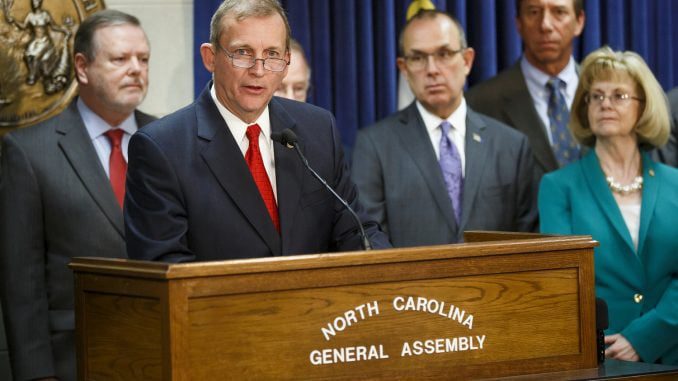
RALEIGH The N.C. Senate released its $22.9 billion state budget Tuesday, focusing spending efforts on raises for state employees, including teachers and principals, community health centers, and tax cuts. The full text of the proposed budget was not released until after press time, but Senate leaders outlined its key spending priorities and pointed to past success building the state’s Rainy Day fund and cutting personal and corporate income taxes.”Anyone who has seen our Senate budgets over the past six years will not be surprised that this budget continues our philosophy of improving outcomes in public education, providing generous tax cuts for the middle class and job creators, controlling spending growth, and saving for the future,” said Senate Leader Phil Berger (R-Rockingham) at a press conference Tuesday afternoon.The plan boosts spending by 3.5 percent over the actual amount the government spent last year, and according to Berger it will include “across-the-board” teacher raises.”It is consistent with what we’ve done thus far in trying to get to the point where a teacher gets to the top of the [pay] scale in 15 years,” said Berger. “We don’t quite get there in this [budget], but we are moving in that direction.”Senate leaders are providing about $600 million more for public education, and would like to award teachers an average 3.7 percent raise this year and 9.5 percent raise over two years.The proposal includes a new plan that will allow teachers licensed in STEM and special education, and those that accept positions in low-performing schools to begin at a higher pay grade on the salary schedule.It also aims to recruit and retain highly qualified principals, with $28.5 million in pay boosts for principals and assistant principals, including an opportunity for principals to earn up to $15,000 in bonuses.Consistent with years past, Senate leadership committed to continued tax relief by proposing to decrease the personal income tax rate from 5.499 to 5.35 percent in 2018, and increasing the amount of income that is exempt from state income tax.The thriving business community in North Carolina will also see continued tax cuts if the Senate plan moves forward, lowering the corporate income tax rate from 3 percent to 2.75 percent in 2018, and to 2.5 percent in 2019.”We’re more interested in giving money back to the taxpayers than the governor,” said Berger. “As we have seen over the past couple of years, when we allow the taxpayers to keep more of their money, they put that money to use in the economy, as opposed to sending it to Raleigh for the government to spend.”The budget process is bound to differ from recent years as Democratic Gov. Roy Cooper now sits in the Executive Mansion. Cooper and the legislature have publicly agreed in principle on focusing state resources on education. However the amounts are different. Cooper released his budget recommendations last month, which proposed spending $23.5 billion in the first year of the biennium increasing to $24 billion in the second year.The plan also appears to include some policy statements including an effort to raise the age of juvenile convictions as an adult from 16 to 18. The issue has been resonating across state government, garnering support from the N.C. attorney general, the judicial branch and the N.C. House which has passed a bill as separate legislation. The Senate budget also creates a new executive level Department of Adult Correction and Juvenile Justice to manage the proposed changes.”It’s a priority of the Senate, and the budget is a document that sets forth priorities,” Berger said, later indicating that one way or another “something will be done” about the raise the age issue this year.The budget also provides $150 million in disaster relief assistance to victims of Hurricane Matthew and upgrades the Controlled Substance Reporting System so doctors and pharmacies can better track prescriptions. It also allocates $15 million over two years to community health centers, rural health centers, free clinics and other health services that focus on uninsured rural communities.The House budget is due to be released next. The two chambers alternate each year taking the first stab at a state budget. After the House passes its budget, conference committees will reconcile differences in the chambers’ budget proposals, at which point the consensus budget will be sent to Cooper for signature. Lawmakers have stated they plan to pass a budget and adjourn the 2017 session by mid-June.



